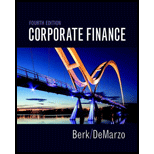
Concept explainers
Consider a project with
- a. What is the
NPV of this project? - b. Suppose that to raise the funds for the initial investment, the project is sold to investors as an all-equity firm. The equity holders will receive the cash flows of the project in one year. How much money can be raised in this way-that is, what is the in initial market value of the unlevered equity?
- c. Suppose the initial $100,000 is instead raised by borrowing at the risk-free interest rate. What are the cash flows of the levered equity, and what is its initial value according to MM?
a.
To determine: The net present value (NPV) of the project.
Introduction:
Net present value (NPV)
The net present value (NPV) is the distinction between the present value of cash inflow and the present value of cash outflow for a particular period of time. NPV is used to analyze the profits of a particular investment or project. The difference between the present value of cash outflow and the present value of cash inflow is termed as the net present value.
Answer to Problem 1P
Explanation of Solution
Calculation of the NPV of the project:
First, calculate the average cash flow of year 1.
Therefore, the average cash flow of year 1 is $155,000.
Now, calculate the NPV of the project.
Therefore, the NPV of the project $29,166.67.
b.
To determine: The initial market value of the unlevered equity.
Introduction:
Unlevered equity defined as a stock of a company that is considered in financing business operations with all equity and no debt, unlevered equity do not have debt as it is a debt source of financing.
Answer to Problem 1P
Explanation of Solution
Calculation of the initial market value of the unlevered equity:
Therefore, the initial market value of the unlevered equity is $129,167.67.
c.
To determine: The cash flows of the levered equity and the initial value according to Modigliani-Miller (MM).
Introduction:
Modigliani-Miller:
The changes of the distribution of cash flows between equity and debt, without altering the total cash flows of the firm is known as Modigliani- Miller. It is denoted by MM.
Answer to Problem 1P
Explanation of Solution
Calculation of the equity value in a strong economy:
If the economy is strong, then the cash for year 1 is $180,000 and borrowing is raised at the risk-free interest rate of $100,000; therefore, borrowing is $10,000 and debt payment is $100,000.
Therefore, equity value in a strong economy is $70,000.
Calculation of the equity value in a weak economy:
If the economy is weak, then the cash for year 1 is $130,000 and borrowing is raised at the risk-free interest rate of $100,000; therefore, borrowing is $10,000 and debt payment is $100,000.
Therefore, equity value in strong economy is $20,000.
Calculation of the initial value according to Modigliani-Miller (MM)
Therefore, the initial value according to Modigliani-Miller (MM) is $29,167.67.
Want to see more full solutions like this?
Chapter 14 Solutions
Corporate Finance (4th Edition) (Pearson Series in Finance) - Standalone book
- Calculate emi solarrow_forwardAccording to car experts, which of the following ordinarily provides the best value in automobile ownership? Always buying a new car and driving it only a few years. Buying a relatively new used car and driving it for a long time. Buying the cheapest used car available.arrow_forwardPat and Chris have identical interest-bearing bank accounts that pay them $15 interest per year. Pat leaves the $15 in the account each year, while Chris takes the $15 home to a jar and never spends any of it. After five years, who has more money? Explarrow_forward
- Solve this finance with no aiarrow_forwardExplain about corporate finance? no aiarrow_forwardSolve it Pat and Chris have identical interest-bearing bank accounts that pay them $15 interest per year. Pat leaves the $15 in the account each year, while Chris takes the $15 home to a jar and never spends any of it. After five years, who has more money?arrow_forward
 EBK CONTEMPORARY FINANCIAL MANAGEMENTFinanceISBN:9781337514835Author:MOYERPublisher:CENGAGE LEARNING - CONSIGNMENT
EBK CONTEMPORARY FINANCIAL MANAGEMENTFinanceISBN:9781337514835Author:MOYERPublisher:CENGAGE LEARNING - CONSIGNMENT Intermediate Financial Management (MindTap Course...FinanceISBN:9781337395083Author:Eugene F. Brigham, Phillip R. DavesPublisher:Cengage Learning
Intermediate Financial Management (MindTap Course...FinanceISBN:9781337395083Author:Eugene F. Brigham, Phillip R. DavesPublisher:Cengage Learning

